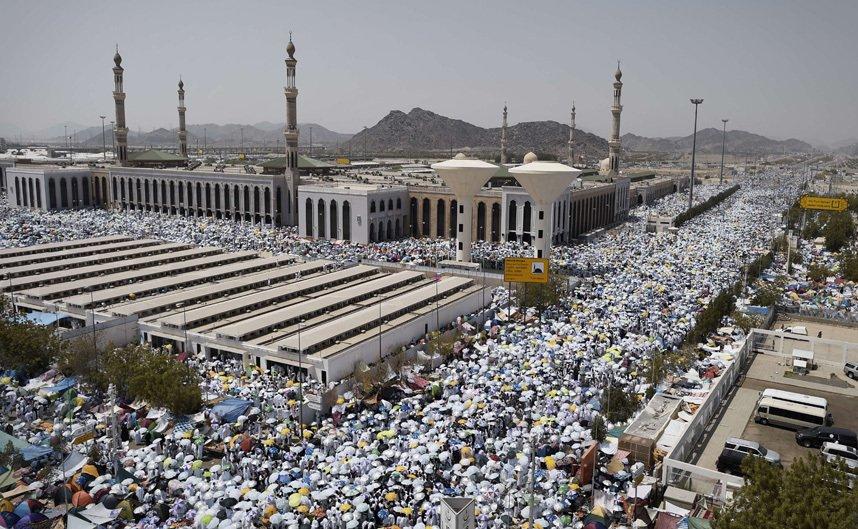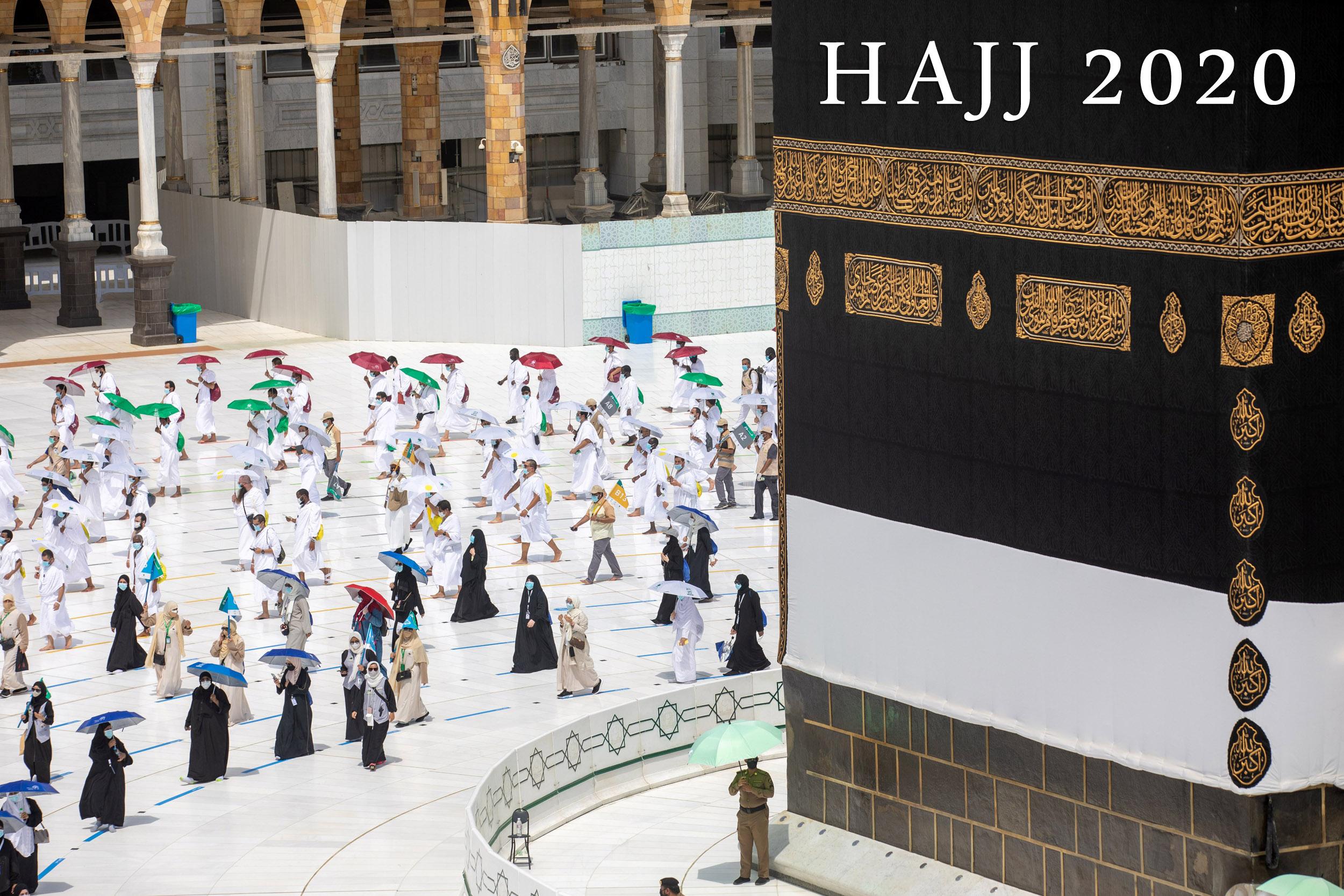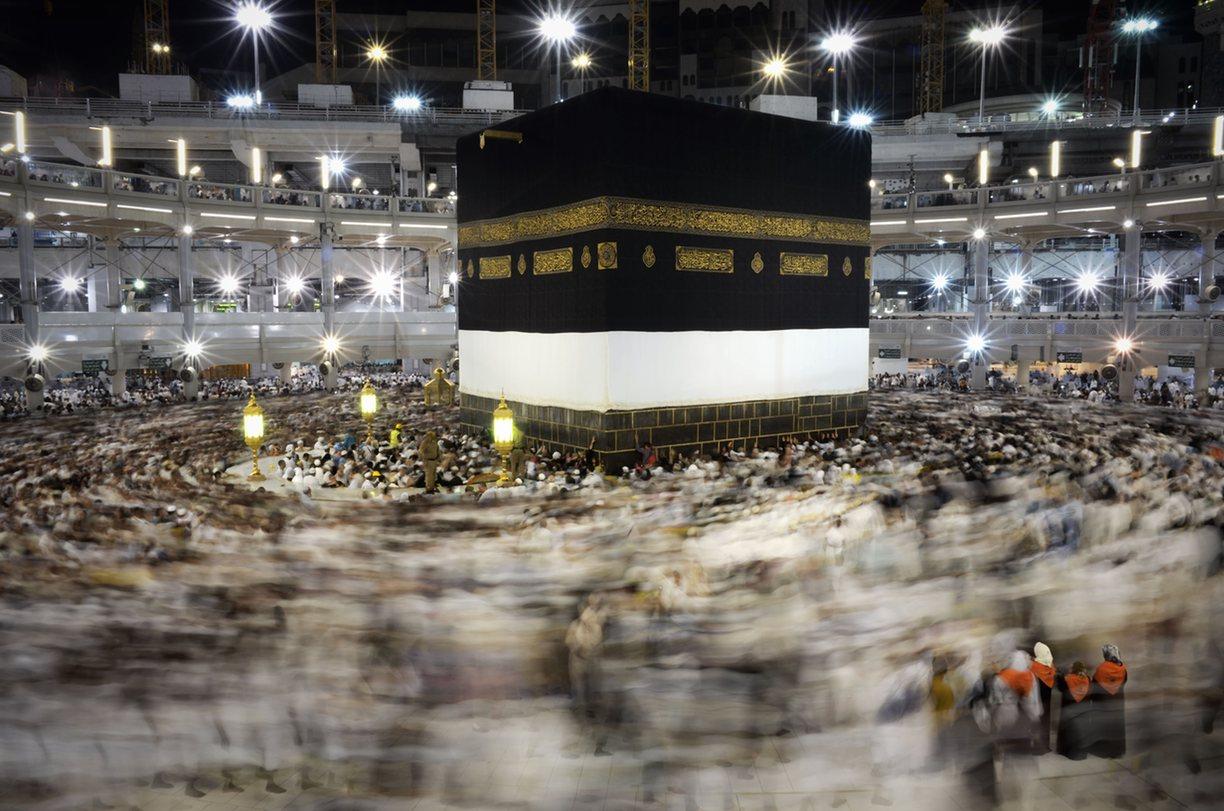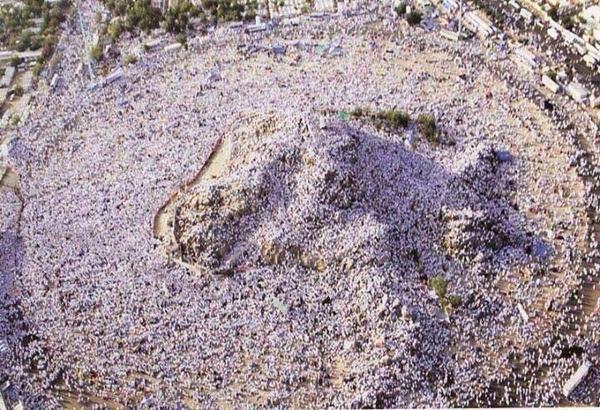Jaabir ibn ‘Abd-Allah رضي الله عنه said, describing the Hajj of the Prophet ﷺ: “Then he started to say the words of Tawheed, ‘“Labbayka Allahumma labbayk, labbayka laa shareeka laka labbayk. Inna al-hamd wa’l-ni’mata laka wa’l-mulk, laa shareeka lak (Here I am, O Allah, here I am. Here I am, You have no partner, here I am. Verily all praise and blessings are Yours, and all sovereignty, You have no partner).’” (Sahih Muslim)
The pilgrim starts his Hajj with Tawheed, and continues to recite the Talbiyah with its words of Tawheed.
The Talbiyah has a number of meanings, such as:
1. “Labbayka Allahumma labbayk (Here I am, O Allah, here I am)” is one response after another, which is repeated to show that the response is lasting and ongoing.
2. “Labbayka Allahumma labbayk (Here I am, O Allah, here I am)” means, I submit and submit again, i.e., ongoing submission.
3. It may mean staying in one place (labba bi’l-makaan) and clinging to it, which means, I am persisting in obeying You, thus emphasizing the meaning of continuous servitude to Allah.
4. One of the meanings of the Talbiyah is confirming love of Allah. There is an Arabic phrase imra’ah labbah (a loving woman) which refers to a woman who loves her child. One only says “Labbayk (Here I am at your service)” to a person whom one loves and respects.
5. It implies sincerity, as in the phrase lubb al-shay’ which means the essence of a thing, and lubb al-rajul which means a man’s mind and heart.
6. It implies drawing close, as in the word ilbaab, which means drawing close, so it emphasizes the meaning of seeking to draw closer and closer to Allah.
7. It is a symbol of the Tawheed of the religion of Ibrahim, which is the spirit and aim of Hajj, indeed the spirit and aim of all the acts of worship. Hence the Talbiyah is the key to this act of worship that the pilgrim is embarking on.
The Talbiyah also includes:
Praise of Allah, which is the dearest thing with which a person may draw close to Allah. It implies recognition of the blessings of Allah, for He is the source of all blessings and the One Who bestows them. It includes acknowledging that all sovereignty belongs to Allah alone, and no one else has any true dominion. (Mukhtasar Tahdheeb al-Sunan, Ibn al-Qayyim, 2/335-339)
When the pilgrim is reciting the Talbiyah, he feels a connection with all other created beings, as they all join with him in submission to Allah alone and echo his Talbiyah. The Messenger ﷺ said: “There is no Muslim who recites the Talbiyah but whatever is to his right and to his left of stones, rocks and clods recites it with him, to the furthest point to the east and the west” – meaning from his right and his left.” (At-Tirmidhi, 828)
Inner Dimensions of Talbiyah
We can understand and deduce the inner dimension of Talbiyah through the Hadeeth in which the Prophet ﷺ said: “When any pilgrim utters Talbiyah, every stone and tree on his right and on his left responds with a (similar) Talbiyah, until the whole earth resounds with it.” [Ibn Khuzaymah]
Reflect on this call and the act of repeating Talbiyah loudly as well as its external and internal impact and how it is related to the call of the founder of this great rite, the intimate friend of Allah, Prophet Ibrahim (Abraham) عليه السلام when Allah The Almighty commanded him to call people and proclaim the message. Allah The Almighty promised him that He will convey his call to all people. Allah Says (what means):
{And proclaim to the people the Hajj [pilgrimage]; they will come to you on foot and on every lean camel; they will come from every distant pass.} [Qur’an, 22: 27]
It means: announce Hajj to mankind and call them to perform Hajj to this House which We have commanded you to build. It was said that Ibrahim عليه السلام said, “O Lord, how can I convey this to people when my voice will not reach them?’’ It was said, “Call them and We will convey it.” So Ibrahim عليه السلام stood up (on his place, or on the Black Stone, or on (the mountain of) As-Safa or on (the mountain of) Abu Qubays and said, “O mankind! Your Lord has established a House so come for pilgrimage to it.’’ It is said that the mountains lowered themselves so that his voice would reach all the corners of the earth, and those who were still in their mothers’ wombs and their fathers’ loins would hear the call. The response came from everything that heard him, from stones, trees, and those whom Allah has decreed will make Hajj, until the Day of Resurrection: “We answer your call, O Allah, we answer your call.” [Ibn Katheer]
It is the slogan of declaring identity. It also indicates that this rite is universal and brings happiness to all creatures, that all beings respond to it and that the Lord of all creatures and the whole universe blesses this rite.
It is the symbol of distinction which differentiates between the advocators of this great Divine rite and the advocators of other contrary earthly projects. It differentiates between this journey to which the whole existence responds and the human nature finds comfort in, and other projects which, if they do not clash, go against existence and are alien to the human nature.








 Dr. Bilal Philips
Dr. Bilal Philips